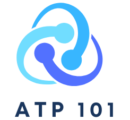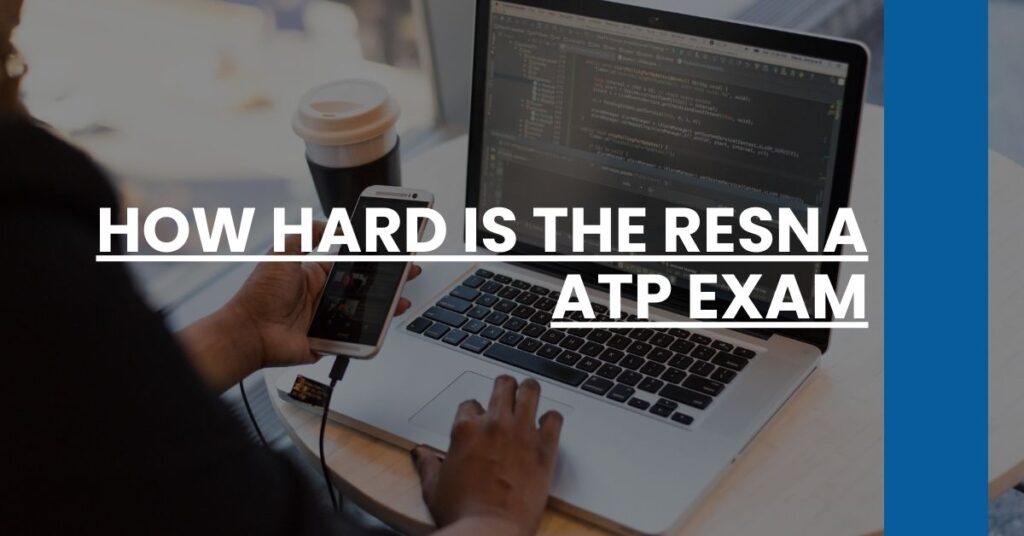How hard is the RESNA ATP exam? It’s a question on many candidates’ minds.
- Exam Preparation: RESNA ATP exam requires thorough preparation; understand the scope and content.
- Study Resources: Utilize study materials tailored to the test’s complexities.
- Test-Taking Strategies: Master effective strategies to boost confidence and performance.
Mastering the RESNA ATP exam challenge starts here.
- Understanding the RESNA ATP Exam
- Eligibility Criteria for the ATP Exam
- Exam Structure and Content Overview
- Registration and Preparation Logistics
- Analyzing the Difficulty of the ATP Exam
- Study Materials and Resources
- Strategies for Effective Test Preparation
- Exam Day: What to Expect and How to Handle It
- Interpreting ATP Exam Scores
- Frequently Asked Questions (FAQs)
- Conclusion: Next Steps After the ATP Exam
Understanding the RESNA ATP Exam
When you’re considering taking the RESNA Assistive Technology Professional (ATP) exam, you must grasp its importance and how it can impact your career. Known for its rigorous standards, the ATP certification is a testament to your expertise in the field of assistive technology. It confirms that you possess a comprehensive understanding of assistive technology (AT) and demonstrates your commitment to enhancing the lives of individuals with disabilities.
The Significance of ATP Certification
Why Pursue ATP? Earning the ATP certification through RESNA, which stands for the Rehabilitation Engineering and Assistive Technology Society of North America, is more than passing an exam. It’s a commitment to a code of ethics, a promise of professionalism, and perhaps most important of all, it reflects a deep dedication to providing quality assistive technology services that empower individuals with disabilities.
A Career Milestone: By obtaining the ATP certification, you open doors to advanced career opportunities. You join an elite group of professionals who are recognized for their specialized knowledge and skills in assistive technology evaluation, customization, and training.
Eligibility Criteria for the ATP Exam
Before delving into the intricacies of the RESNA ATP exam, it’s essential to assess whether you meet the eligibility requirements set forth by RESNA. These criteria ensure that all candidates have a solid foundation upon which to build their assistive technology expertise.
Educational and Professional Prerequisites
- Educational Background: RESNA requires candidates to have a minimum educational qualification, such as a master’s degree in Special Education, Rehabilitation Engineering, or a related field.
- Work Experience: Coupled with your educational background, you are expected to have practical experience. This includes either six months or 1,000 hours of direct AT work, the specifics of which can vary based on your level of education.
Understanding these preliminary steps can be crucial in aligning your career trajectory with the requirements for ATP eligibility.
Exam Structure and Content Overview
The RESNA ATP exam structure is a reflection of the broad and nuanced field of assistive technology. With a mixture of multiple-choice questions that span various knowledge domains, the task ahead may seem daunting. Here’s what you can expect:
Breaking Down the Exam Structure
- Number of Questions: The ATP exam consists of 200 questions, with 175 counted towards your score and the remaining 25 evaluated for future exams.
- Core Knowledge Domains: The questions are categorized across five domains, ranging from the assessment of need, to intervention strategies, and professional conduct.
- Test Format: The exam is computer-based and administered at various testing centers.
To further understand the depth of the test topics, visit RESNA’s website.
Registration and Preparation Logistics
As you ready yourself for the ATP exam, streamline your registration process by staying on top of crucial deadlines and fees. The administrative steps may seem laborious, but they’re straightforward.
- Verify Eligibility: Begin by gathering the necessary documents that confirm your educational qualifications and work experience.
- Application Submission: Once your eligibility has been confirmed, proceed with submitting your application to RESNA.
- Fee Payment: Upon application acceptance, you’ll need to pay the exam fee – an investment in your professional future.
By staying updated on these logistics, you contribute to a smooth test-taking experience. Make sure you’re well-prepared to navigate scheduling your exam.
Analyzing the Difficulty of the ATP Exam
As you question “how hard is the RESNA ATP exam,” consider that difficulty is subjective but can be demystified by understanding the challenge’s nature and preparing adequately.
Factors That Impact Exam Difficulty
- Breadth of Material: The exam covers a wide array of assistive technology topics, making it imperative to have a holistic understanding of the field.
- Application-Based Questions: The ATP exam tests your ability to apply conceptual knowledge to real-world scenarios.
- Passing Threshold: Considering the passing score is set at a robust 70%, your preparation needs to be thorough and strategic.
Bear in mind that the difficulty of the ATP exam shouldn’t deter you – instead, view it as a challenge to conquer. By acknowledging the complexities of the exam, you equip yourself with the mindset required to tackle it head-on. Familiarize yourself with information provided by RESNA, which can serve as a beacon throughout your preparation RESNA Certification.
Study Materials and Resources
Preparing for the RESNA ATP exam can feel overwhelming, but having the right study materials and resources can make a significant difference. Your success hinges on the quality and relevance of your prep tools. Here’s a curated list of resources to help you tackle the complexities of the exam.
Official RESNA Offerings
Experience has shown that the best preparation aligns closely with the source, and RESNA offers a wealth of materials designed specifically for the ATP exam:
- RESNA AT Fundamentals Course: This comprehensive online course is designed to cover the basics of assistive technology and prepare you for the ATP exam.
- ATP Exam Readiness Tool: This free toolkit assesses your knowledge and readiness for the exam, pinpointing areas where you might need further study.
- Practice Tests: Familiarizing yourself with the format and questioning style of the exam through practice tests is invaluable.
Dive into these preparation tools to start your journey with confidence.
Supplementary Study Aids
While the official materials are fundamental, various third-party resources can enhance your study regime:
- Study Guides: Commercial preparation books often provide a structured approach to learning, breaking down complex topics into digestible segments.
- Flashcards: Engaging with flashcards can activate your memory and improve recall – a handy technique for hard-to-remember details.
- Online Forums and Study Groups: Connecting with peers, sharing tips, and discussing concepts can reinforce your learning and expose you to different perspectives.
Collectively, these study guides and flashcards serve as your arsenal in the battle against uncertainty and under-preparation.
Strategies for Effective Test Preparation
It’s not just the hours of study that count, but how you use them. As you contemplate how hard the RESNA ATP exam is, remember that a smart approach can ease the process.
Building a Study Schedule
The journey to conquering the RESNA ATP exam requires planning. Breaking down your study time into manageable blocks can help you cover all the necessary content without burnout:
- Allocate Time for Each Domain: Ensure that you devote enough time to each of the five knowledge domains, as all are critical for a balanced understanding.
- Regular Review Sessions: Consistent review can prevent last-minute cramming and boost retention.
Targeted Study Techniques
- Active Recall: This method, which involves testing your memory frequently, can fortify your learning and ability to remember information under exam pressure.
- Spaced Repetition: Spacing out to study sessions for specific topics can help in moving information from short-term to long-term memory more effectively.
Implementing these effective strategies allows you to maximize the effectiveness of each study session and approach the test with a calm, well-prepared mind.
Exam Day: What to Expect and How to Handle It
The day of the ATP exam is as much about mental preparation as it is about the knowledge you’ve amassed. Here’s how to ensure the day goes smoothly.
Before the Exam
- Essential Documents: Bring the necessary identification and confirmation of your exam booking.
- The Right Mindset: Approach the day with positivity. A calm mind can greatly enhance your performance.
During the Exam
- Time Management: Keep an eye on the clock to ensure you’re pacing yourself effectively, allocating adequate time for each question.
- Reading Questions Carefully: Misunderstanding a question is an avoidable mistake. Take the time to read each question thoroughly.
Preparing for this experience mentally and logistically helps manage anxiety and allows you to focus on the task at hand – securing your ATP certification.
Interpreting ATP Exam Scores
Once you’ve completed the exam, your focus will naturally shift to the results. Understanding how to interpret your scores is critical for processing your outcomes constructively.
Passing the Milestone
A passing score on the ATP exam is an accomplishment worth celebrating and reflects a high degree of proficiency in assistive technology principles. Keep in mind, 70% is the magic number – achieving this benchmark demonstrates that you possess the knowledge and skills RESNA expects from an ATP-certified professional. You’ll receive immediate notification of your pass/fail status, allowing you to quickly determine your next steps.
Constructive Analysis of Scores
Should you encounter the hiccup of not passing, don’t be disheartened. The score report includes valuable feedback, which is an opportunity for growth. It highlights the areas where improvement is necessary, guiding your study efforts should you choose to retake the exam.
Perusing the official ATP Candidate Information Bulletin offers a clear breakdown of the scoring process and additional details that might benefit your preparation.
Frequently Asked Questions (FAQs)
When preparing for a formidable test like the RESNA ATP exam, questions abound. Below are answers to some common queries that may clarify the hurdles ahead.
- How often can I take the exam?
You can take the ATP exam up to three times in one year, allowing you opportunities for improvement. - What is the best way to tackle difficult questions?
It’s recommended to flag questions you’re uncertain about to review them later within the allocated exam time. - Are there any official ATP exam prep courses?
Yes, RESNA offers an official AT Fundamentals Course that many candidates find beneficial.
Conclusion: Next Steps After the ATP Exam
As you digest all the information and strategies presented in this guide, remember that the RESNA ATP exam, while challenging, is a pinnacle you can reach with dedicated preparation and the right mindset.
After all, the ATP certification is not merely a test passed but a signal to the world of your commitment and expertise in improving lives with assistive technology. Whether you sail through on the first attempt or take it as a learning opportunity, what counts is your determination and dedication to the assistive technology field.
With your studies, sharpened by the resources and tips explored here, you’re well-prepared to prove to yourself, and to your future clients, just how capable you are as an Assistive Technology Professional.

